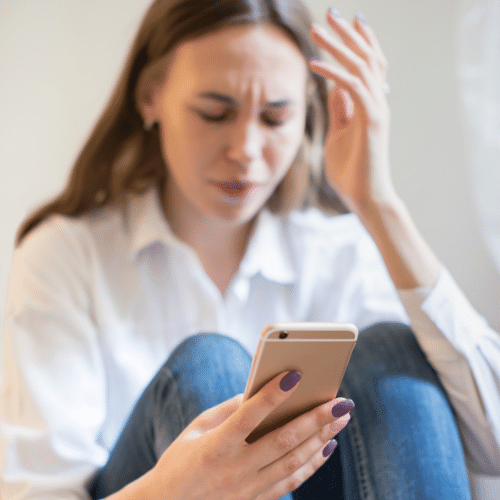How to Stop Seeking Validation: 7 Strategies for Women
Takeaway: While there’s nothing inherently wrong with seeking external validation, it has its downfalls. You might feel exhausted from trying to keep up with others’ expectations, or feel completely out of touch with your own wants and needs. In this post, I share some of the most common reasons why you might do this, plus my tips for how to stop seeking validation from others.
It's time to get curious about why you constantly feel like you need to seek approval from others. There are many reasons that a person seeks validation from others. It may make you feel confident, worthy, accepted, and less anxious.
But when we start to turn the focus inwards, you can build your awareness on what you are really getting from seeking approval and if it is helping you. By building your self-confidence, having coping strategies to manage your emotions, and by validating yourself, you can stop seeking approval from external sources.
These are skills that you can learn and work on in therapy to ensure that you have a safe place to talk about these challenges and recognize what you can do to live more confidently.
What is external validation?
External validation is getting approval or affirmation from others. This can look like someone validating your feelings, giving you compliments, agreeing with you, or getting "likes" on social media. External validation usually gives you immediate gratification and don't get me wrong, it feels good!
There is no problem with seeking validation from others, but it can become a problem when it's the only validation that makes you feel good. This can lead to issues with your self-esteem, your decision-making, and how you are living your life on a daily basis.
External validation is different from internal validation. Internal validation is validating and accepting your own feelings or thoughts and acknowledging your strengths. This can be even more gratifying because it isn't a short-lasting feeling.
You are with yourself wherever you go so by using self-validation, you will feel better more often. Building internal validation is an extremely valuable skill to have.
Why do I seek validation from others?
There are many reasons that you may seek validation from others. Most of the time, seeking validation is due to low self-esteem, anxiety, and/or wanting approval.
First things first, there is no problem with wanting to be validated by others. We are all human and that is a normal thing to want. The concern comes into play when we are wanting validation for the "wrong" reasons such as gaining our worthiness or confidence based on somebody else's approval.
Specifically for women, we have been taught by society and our culture that we have more value by making sure other people approve of us. Women have been taught that we should act in accordance with what other people would approve of in order to be "good enough."
Seeking validation due to cultural expectations for women
If you struggle with seeking validation from others, you're not alone—and it's not your fault. In fact, experts remind us that this is a cultural phenomenon. There's even a name for it: self-objectification theory.
According to this theory, women place a significant amount of weight on what others think of their bodies. This is a direct result of living in a culture that objectifies women's bodies. Our culture tells us that our worth is based on others' approval of how we look, so it's natural that we internalize these expectations.
If you feel more worthy when you receive external validation, you are more likely to engage in this and/or need approval from others to feel good about yourself.
Seeking validation due to anxiety
This is also where social media comes into play. One study found that excessive time spent on Facebook reinforces a person's likelihood to experience anxiety and that people with anxiety tend to spend more time on Facebook in order to receive external validation.
Experts have extensively studied anxiety, personality traits, and the need for others' approval in an in-person context. However, social networking sites offer a new type of interaction that can reveal how these factors contribute to a person's attitudes, behaviors, and emotions.
Also consistent with expectations, research shows that the need for approval was positively associated with anxiety. Findings indicate that the more an individual needs approval from others, the more anxious they tend to be. This is consistent with research that deriving one's self-worth from another's approval is an external contingency that one cannot control.
It is important to stop relying on other people to make you feel good and to start finding ways to build your self-confidence from within.
How to stop needing validation
There are a few ways that you can stop needing validation. It will just require some internal work. Namely, you'll need to work on practicing self-validation. Of course, this is much easier said than done, especially in a society that makes it hard for women to feel good about themselves. However, it is possible.
7 tips to learn how to stop seeking external validation
Learning how to self-validate is an important step to build confidence. If you're ready to try, start with these strategies (and be patient with yourself throughout the process). Don't worry about getting it perfect. Simply trying to show up for yourself in this way is worth celebrating!
1. Setting boundaries
Setting boundaries with others is extremely important to develop your self-esteem. When you can limit the impact others have on you, you'll be able to grow your self-worth on your own.
This can involve setting energetic boundaries between yourself and others, such as mentally reminding yourself that another person's opinion doesn't matter as much as your own.
This can also involve more explicit boundaries, like saying no more often to others. Practice being more assertive when you communicate with others and being clear about what you want and need. Over time, this can reduce the people-pleasing and perfectionistic behaviors that keep you stuck.
2. Practice internal validation
You can practice internal validation by acknowledging your accomplishments (big or small!), using positive affirmations, and identifying what is important to you in your own life. To start off, this could be something as simple as writing "I am worthy" on a sticky note and putting it on your mirror.
3. Practice self-compassion
How would you talk to a friend who was experiencing what you are experiencing? More likely than not, you would be a lot kinder to your friend than you are to yourself.
Sometimes it's helpful to talk to yourself than you would talk to your friend. Use compassion, encouragement, and positivity to help build your confidence. Remember, we are all human, we all feel, we are not perfect, and we all deserve compassion.
4. Reduce your time on social media
Reducing your time on social media will help with reducing your anxiety, reducing your tendency to compare yourself to others, and reducing your need to get other people's approval or "likes" in order to feel worthy. Plus, it'll keep you more grounded in the present moment.
5. Becoming aware of unrealistic expectations
Building awareness around unrealistic expectations for yourself is an important part of learning how to stop seeking validation from others. We often hold ourselves to higher (sometimes impossible) standards, and becoming aware of it can help us shift those expectations.
6. Practice effective coping strategies
Using coping strategies to help regulate yourself vs depending on others to make you feel better is a great first step. Being mindful, engaging in mindfulness meditation, and exercising are effective ways to feel less stressed and more regulated.
7. Challenge or reframe your beliefs
Checking the accuracy of your thoughts is another important tool you can use to stop seeking validation. For example, you might engage in binary thinking that you're either all good or all bad. But is this actually true?
External validation may be needed for your well-being, but self-validation and instilling more positive and empowering beliefs can be important to cultivating and maintaining healthy self-esteem.
Therapy can help you stop seeking external validation
Relying on others to make ourselves feel good is only a short-term solution. When we shift the focus internally and begin to value our own opinion, strengths, and values, we can keep this skill with us for our entire life.
If you need help reducing your need for external validation and are ready to make changes to live a more confident and fulfilling life, therapy is a great place to start. In therapy, you can learn strategies to help improve your self-confidence and sense of self in order to live a more aligned and happy life.
Together in therapy, we can reduce your need for external validation by working on attaining healthy self-esteem and living a life you love. Plus, you'll learn new ways to practice physical and emotional self-care to help you feel balanced and grounded.
As a therapist for women in Denver, I use a strengths-based, trauma-informed approach in my practice, along with modalities like cognitive behavioral therapy (CBT), mindfulness, and eye movement desensitization and reprocessing therapy (EMDR). I also believe that building awareness around the connection between our mind & body is necessary to heal.
Ready to get started? Reach out today to schedule a free consultation. I look forward to connecting with you!





